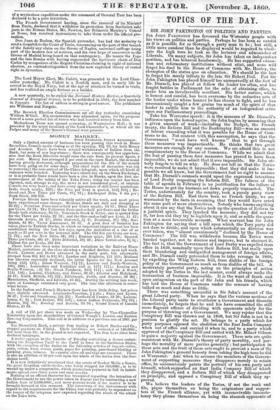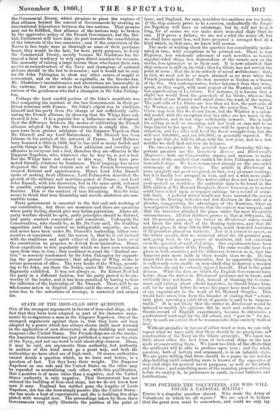TOPICS OF THE DAY.
SIR JOHN PAKINGTON ON POLITICS AND PARTIES. Sin Ram. PaxxxotoN has favoured the Worcester people with his views on politics and parties. Perhaps he has been as candid as it is possible for SO thorough a party man to be ; but still, a little more candour than he displayed would be required to vindi- cate the high tone he took as the lecturer and admonisher of Liberals. On many subjects, Sir John has taken an independent
position, and has behaved handsomely. He has supported educa- tion and reformatory institutions without stint, and none will forget his duel fn the House of Commons with Mr. Henley, the tion and reformatory institutions without stint, and none will forget his duel fn the House of Commons with Mr. Henley, the champion of the status quo on education., We should 1m the last
to forget his manly tribute to the late Sir Robert Peel. But Sir John Pakington has placed himself too unreServedly at the feet-of
Mr. Disraeli, has played at follow the leader too often, and has fought battles in Parliament for the sake of obtaining office, to make him an invulnerable asiailant. His better nature, which is honest and candid, has been overcome by the seductive arts of the leadez under whose banner he has Chosen to fight, and he has unconsciously caught a few grains too much of the spirit of that leader to entitle him to the authority of an independent critic upon our Parliamentary proceedings. Take his Worcester speech: it is the measure of Mr. Disraeli's influence upon the honest squire. Sir John begins by assuming that a given amount of work—including the Budget, the French treaty, the Reform Bill and the Bankruptcy Bill—was an amount of labour exceeding what it was possible for the House of Com- mons to do. Not content with this assumption, be says that the Government "must have well known" that to get through
these measures was impracticable. He thinks that two great measures are enough i for any session. We are afraid this is not complimentary to the House of Commons.. While we admit that the teat of passing these four measures has proved to have been impossible we do not admit that it was impossible. Sir John ut- terly forgets to tell us why. He does not tell us that the Tories were resolved to make it impossible ; that they did make it im- possible we all know, but the Government had no right to assume that Mr. Disraeli's counsels would upset the expressed intentions of Lord Derby respecting the Reform Bill. The fulness of the table of agenda in February is no justification for the failure of the House to get the business set down properly transacted. The Tories, unfortunately for the country, took a purely party view of the Reform Bill. Had there been no French treaty, we are warranted by the facts in assuming that they would have acted the same part of mere obstructives. Nobody who knows anything about it can say that the Tories took up the question of Reform in a judicial spirit. They 'picked the measure; they did not try it, far less did they try to legislate upon it, and so settle the ques- tion at a most favourable moment. What warrant hae Sir John Pakington for saying that a bill upon which the Tory party did not dare to divide, and upon which substantially no division was ever taken, was "almost unanimously" declined by th,e House of Commons ? The bill was withdrawn because the Tories were banded together' not to discuss and improve, but to obstruct it. The fact is, that the Government of Lord Derby was expelled from office in 1859, nominally upon their Reform Bill, but really upon their blundering and undignified management of foreign affairs, and Mr. Disraeli easily persuaded them to take revenge in 1860, by expelling the Whig Reform Bill, from dislike of the foreign policy of the Government as much as from dislike of the bill. A moderately powerful party, acting on the principles of action adopted by the Tories in the last session, could always make the transaction of business impossible. It, is the want of frank and open antagonism on the part of Sir John and his friends, which has laid the House of Commons under the censure of having talked so much and done so little.
There was something uncandid in Sir John's account of the great Liberal party. When he says that_the various sections of the Liberal party unite to overthrow a Government and disunite immediately, he forgets that he and his have committed the still more flagrant offence of dividing with opponents solely for the purpose of throwing out a Government. We may rejoice that the Conspiracy Bill was thrown out in 1858, but Sir John is not in a position to glorify the act. He belongs to a party which for party purposes opposed the abolition of the East India Company when out of office and carried it when in, and to a party which approved of the Conspiracy Bill and united with Mr. Ifilner Gibson to gain a majority against the Government. These acts tu'e quite consistent with Mr. Disraeli's theory of party morality, and per- haps the morality of mere parties generally ; but participation in these acts and the fruit of these acts ought to prevent a man of Sir John Pakington's general honesty from taking the high tone he did at Worcester. And when he accuses the members of the Govern- ment of supporting measures they disapprove merely to retain office, he unconsciously paints the portrait of his own party and Iiimself,'which supporte& an East India Company Bill of which they disapproved, and a Reform Bill of which they disapproved on principle, and opposed a Conspiracy Bill of which they ap- proved.
We believe the leaders of the Tories, if not the rank and file, pique themselves on being the originators and suppor- ters of the French alliance, yet with inconceivable inconsis- tency they plume themselves on being the staunch opponents of
the Commercial .Treaty, which promises to place *Kt rupture of that alliance beyond the control of Governinents by creating an international dependence between the two nations. That promise may not be fulfilled, that alliance of the nations may be broken by the aggressive policy of the French Government, but the Bri- tish Parliament will have done its part towards the consolidation of the interests of the two countries ; and if the conversion of the Tories to free trade were as thorough as some of their partisans boast, they would be the last, for mere party purposes, to decry the Commercial Treaty, merely because Mr. Gladstone has be- trayed a fatal tendency to rely upon direct taxation for revenue. The necessity of raising a large income those who Vaunt their own merits as reconstructors of the Navy and champions of national defence should be the last to denounce; and it would not be easy for Sir John Pakington to show any other source of supply so convenient, and on the whole so equitable, as the Income-tax. Mr. Gladstone's inconsistencies and aberrations are lamentable in the extreme, but not more so than the inconsistencies and aber- rations of the gentlemen who find a champion in Sir John Peking- ton.
Perhaps the least candid portion of Sir John's manifesto was that comparing the conduct of the two Governments in their po- litical relations with France. Sir John's object was to vindicate himself and his party from the charge of not sufficiently culti- vating the French alliance, by showing that the Whigs have cul- tivated it less. It is a popular but a fallacious mode of disproof. Now the difference between the modes of cultivating the French alliance adopted by the two Governments is simply this. No men have been greater adulators of the Emperor Napoleon than Mr. Disraeli and my Lord Malmesbury. Mr. Disraeli has been fulsome in his praises of the autocrat of France. Lord Malmes- bury bounced a little in 1859, but he has said as many foolish and servile things as Mr. Di,sraeli. Now adulation and servility are offensive to everyone but a fool, therefore they are offensive to the Emperor Napoleon, who, whatever else he may be, is not a fool. But the Whigs have not sinned in this way. They have pro- moted friendly relations by frankness. Their language has never disguised the fact that certain acts of the French Government created distrust and apprehension. Hence Lord John Russell spoke of seeking fresh alliances ; Lord Palmerston described the growth of the military and maritime power of France ; and Lord John Russell, with less discretion, but in the same spirit, referred to possible enterprises favouring the expansion of the French frontier. This is the conduct of true friendship. But Sir John seems to think that true friendship and servile adulation are con- vertible terms.
Party government is essential to the fair and safe working of our constitution, but there are moments and there are questions when party feeling should give way before patriotism. Above all, party warfare should be open, party principles should be distinct, and party conduct consecutive and consistent. Unhappily the Conservatives, who should be, as Mr. Du Cane said, the standing opposition until they control an indisputable majority, are not, and never have been under Mr. Disraeli's leadership, either con- secutive or consistent. And the reason is, that he is not imbued with the traditions and spirit either of the party he leads or of the constitution he proposes to defend from innovation. Hence those expedients to win popularity which we have seen ventured upon from time to time ; that readiness to court the "Radical sec- tion" so severely condemned by ir John Pakington for support- ing the present Government ; that adoption of Whig views to secure possession of office. The very faults of the Whigs, accord- ing to Sir John, are those the Tories, under Mr Disraeli, have so flagrantly exhibited. It was not always so. Sir Robert Peel led the party in a different fashion, but the party proved to be un- worthy of the leader, and it has been punished by having to bear the infliction of the leadership of Mr. Disraeli. There will be no wholesome action in English politics until the error of 1847, an error due to the seductions of revenge, is corrected and atoned for.



























 Previous page
Previous page